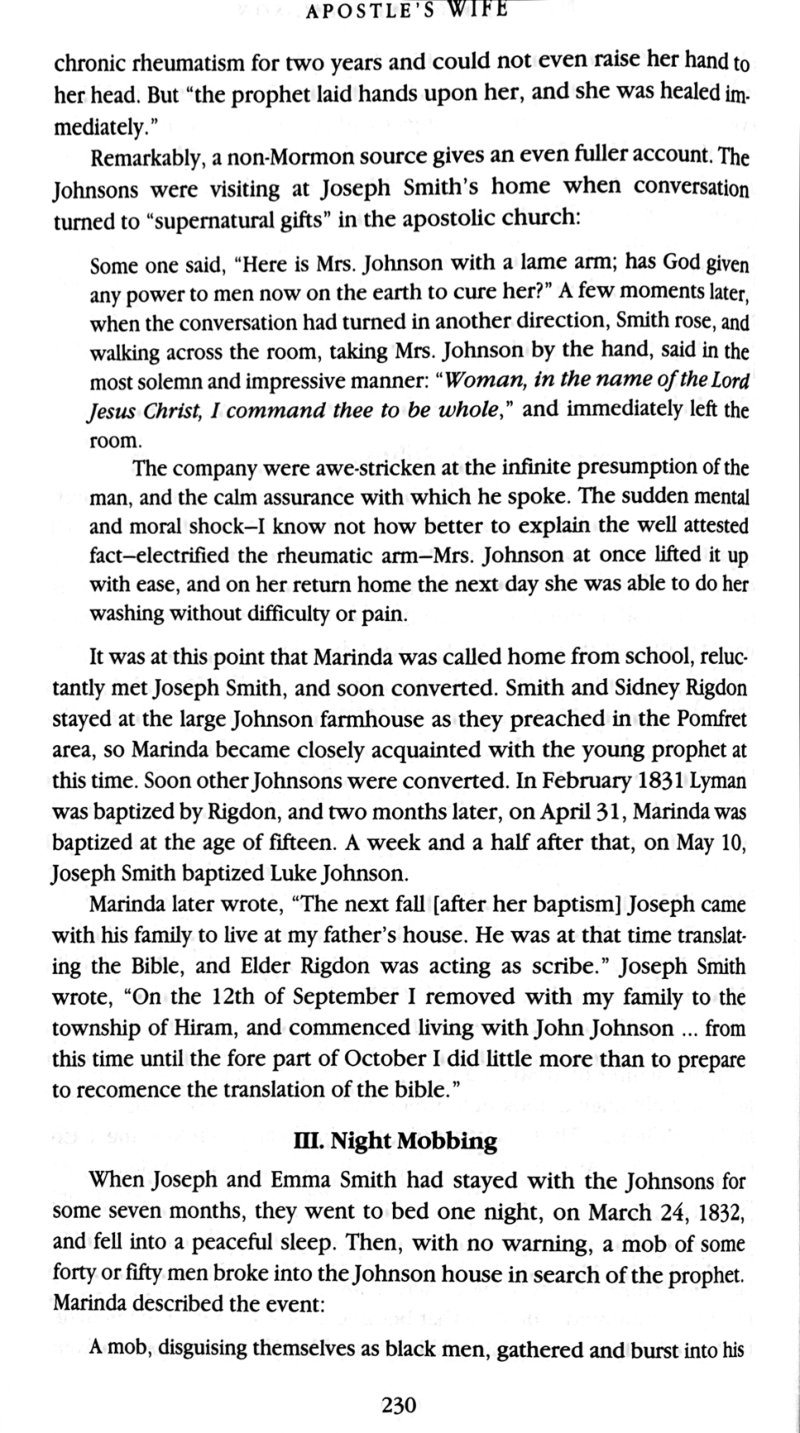Todd M. Compton discusses Joseph's tar and feathering incident of 1832.
- Type
- Book
- Source
- Todd M. Compton LDSDisaffected
- Hearsay
- Secondary
- Reference
Todd Compton, In Sacred Lonliness: The Plural Wives of Joseph Smith (Salt Lake City, UT: Signature Books, 1997), 230–232
- Scribe/Publisher
- Signature Books
- People
- Todd M. Compton
- Audience
- Reading Public
- Transcription
When Joseph and Emma Smith had stayed with the Johnsons for some seven months, they went to bed one night, on March 24, 1832, and fell into a peaceful sleep. Then, with no warning, a mob of some forty or fifty men broke into the Johnson house in search of the prophet. Marinda described the event:
A mob, disguising themselves as black men, gathered and burst into his [Smith's] sleeping apartment one night, and dragged him from the bed where he was nursing a sick child. They also went to the house of Elder Rigdon, and took him out with Joseph into an orchard, where, after choking and beating them, they tarred and feathered them, and left them nearly dead. My father, at the first onset, started to the rescue, but was knocked down, and lay senseless for some time.
According to Luke Johnson, Smith was stretched on a board, then "they tore off the few night clothes that he had on, for the purpose of emasculating him, and had Dr. Dennison there to perform the operation. But when the Dr. saw the prophet stripped and stretched on the plank, his heart failed him, and he refused to operate."
The motivation for this mobbing has been debated. Clark Braden, a late, antagonistic, secondhand witness, alleged in a polemic public debate that Marinda's brother Eli led a mob against Smith because the prophet had been too intimate with Marinda. This tradition suggests that Smith may have married Marinda at this early time, and some circumstantial factors support such a possibility. The castration attempt might be taken as evidence that the mob felt that Joseph had committed a sexual impropriety; since the attempt is reported by Luke Johnson, there is no good reason to doubt it. Also, they had planned the operation in advance, as they brought along a doctor to perform it. The first revelations on polygamy had been received in 1831, by historian Danel Bachman's dating. Also, Joseph Smith did tend to marry women who had stayed at his house or in whose house he had stayed.
Many other factors, however, argue against this theory. First, Marinda had no brother named Eli, which suggests that Braden's accusation, late as it is, is garbled and unreliable. In addition, two antagonistic accounts by Hayden and S. F. Whitney give an entirely different reason for the mobbing, with an entirely different leader, Simonds Ryder, an ex-Mormon, though the Johnson brothers are still participants. In these accounts the reason for the violence is economic: the Johnson boys were in the mob because of "the horrid fact that a plot was laid to take their property from them and place it under the control of Smith." The castration, in this scenario, may have only been a threat, meant to intimidate Smith and cause him to leave Hiram.
After describing the event, Marinda wrote only, "Here I feel like bearing my testimony that during the whole year that Joseph was an inmate of my father's house I never saw aught in his daily life or conversation to make me doubt his divine mission." While it is not impossible that Marinda became Smith's first plural wife in 1831, the evidence for such a marriage, resting chiefly on the late, unreliable Braden, is not compelling. Unless more credible evidence is found, it is best to proceed under the assumption that Joseph and Marinda did not marry or have a relationship in 1831.
- Citations in Mormonr Qnas
The B. H. Roberts Foundation is not owned by, operated by, or affiliated with the Church of Jesus Christ of Latter-day Saints.

